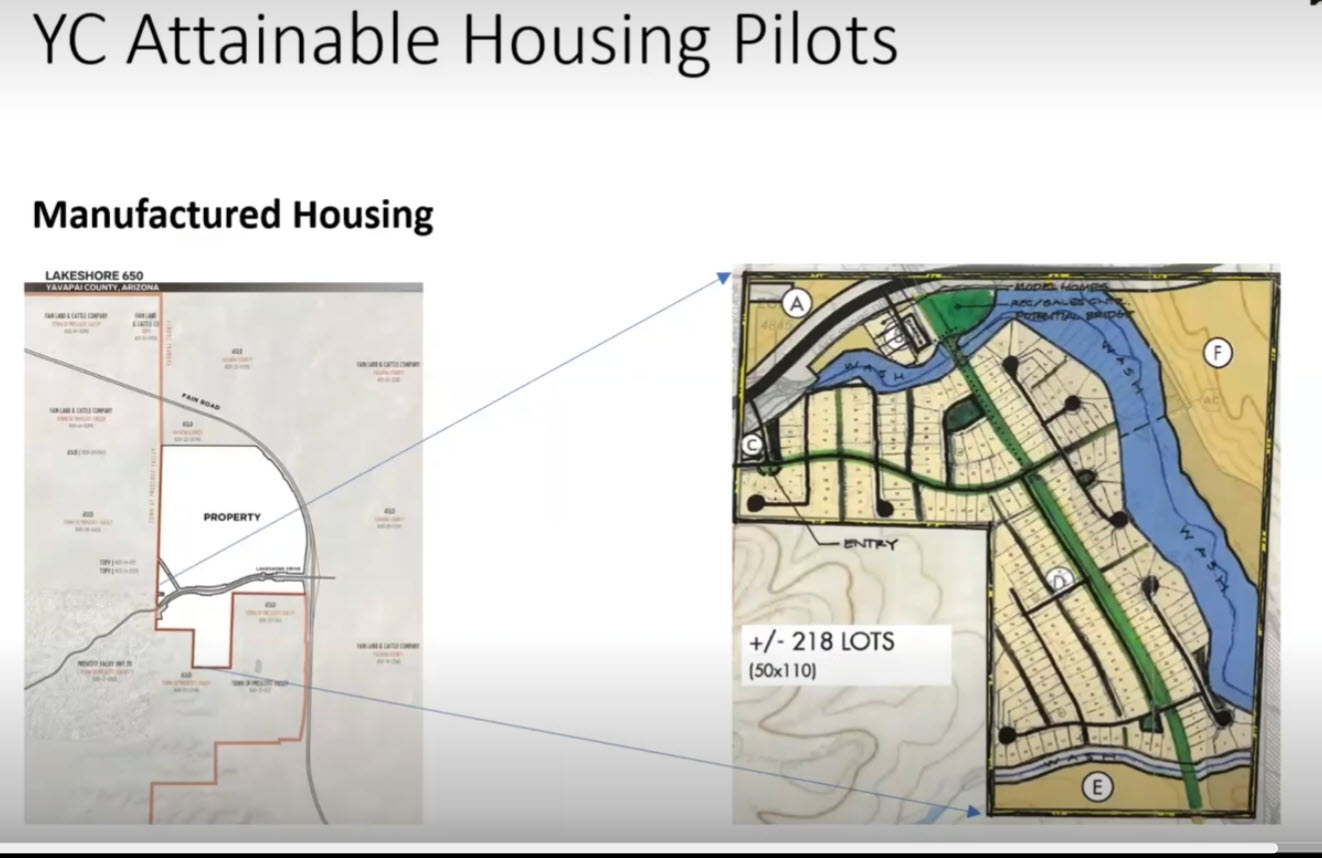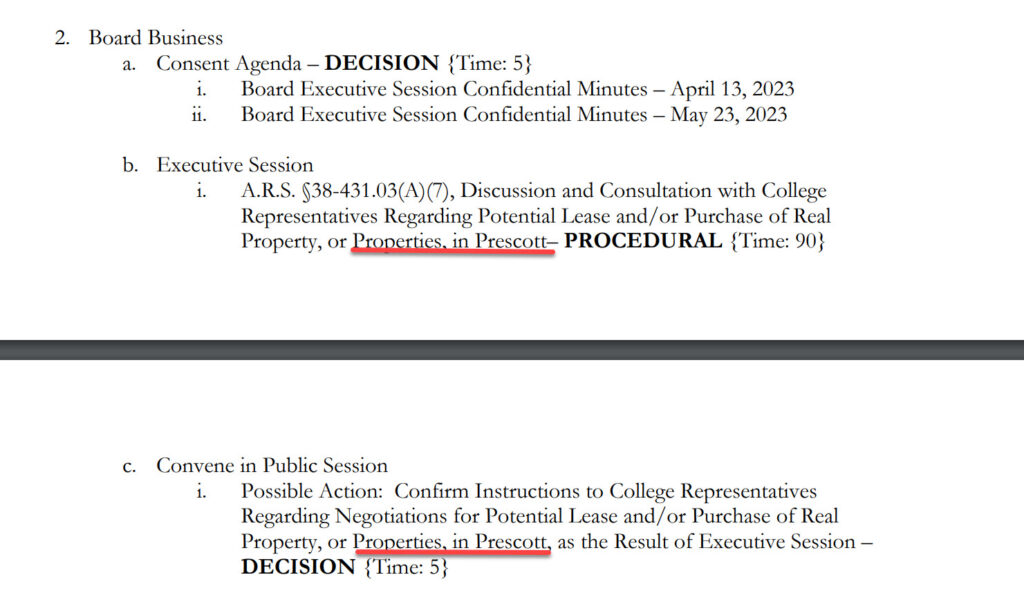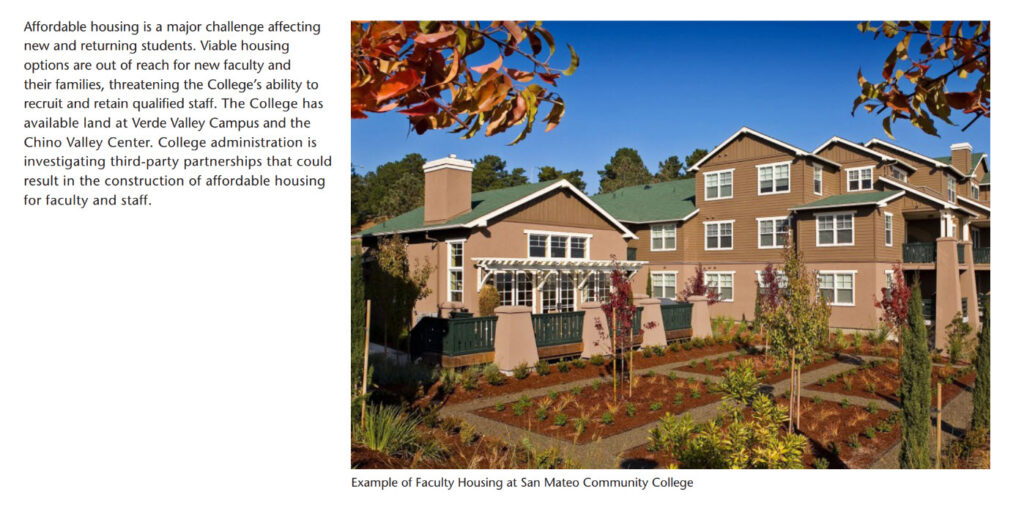Archive for Housing
YAVAPAI COMMUNITY COLLEGE VERDE VALLEY CAMPUS COTTONWOOD STUDENT APARTMENT EXPERIMENT APPEARS AT AN END – NO STUDENTS APPLIED
YAVAPAI COMMUNITY COLLEGE GOVERNING BOARD TOLD IN NOVEMBER THAT COLLEGE ADMINISTRATORS ARE WORKING WITH FAIN GROUP ON LAKESHORE DEVELOPMENT IN PRESCOTT VALLEY FOR NEW HOUSING
Dr. Ewell says College plans “to participate in that project as it works its way through the approval process”
Dr. Clint Ewell, Yavapai Community College’s Vice President of Finance & Administrative Services, explained to the Community College District Governing Board that the administration was looking at working with the Fain Group on a project involving the development of housing in Prescott Valley for staff and faculty (possibly students?).
The following is a transcript of a portion of what Dr. Ewell told the Board about this possible project:
“A third pilot that has been approved by the board is becoming involved with the Lakeshore Project again with the Fain signature group in Prescott Valley. They are going through the process of developing some land on the east side and having that land brought into the town limits of PV. If you look on the left hand side, that’s the whole project. Below the ravine is that little kind of upside down L-shaped property.
“And the large image on the right is a blow-up of that. And that’s where they plan to build some attainable housing. It will be a combination of both manufactured housing and modular housing, and we plan to participate in that project as it works its way through the approval process.
“So far, we’ve not made a capital investment as of yet. As part of that project, the fans introduced us to a product from Xeni home. Again, it’s I have manufactured, I made a mistake. This is actually a modular home. It’s built to local zoning code standards. They come in both 306 hundred square foot units. They can stand alone, as you see in the picture on the left, or they can be combined into row houses or even apartment buildings, and they come fully furnished, including most of the furniture.
“So I had a chance to go down and see some of the units in Tempe at the end of last summer. And I think we were very impressed with the quality of what they’re offering. . . .”

SHOWCASE HOMES BUILT BY COMMUNITY COLLEGE ON CHINO VALLEY CENTER NOT CERTIFIED FOR OCCUPANCY
Administration says they are only “demonstration homes.” Is this another Governing Board failure to provide adequate information, transparency and accountability in overseeing how funds are spent on a taxpayer-supported project?
Recall that back on January 27, 2020, the District Governing Board showed no opposition to a proposal made by the College executives to spend almost a half million dollars to purchase two 3D concrete printers. The information given to the Board at the time suggested that the printers could complete the foundation, interior, and exterior walls for a medium-sized home in 3-5 days.
After roofing, electrical, plumbing, and other services were installed, it was thought that these 3D printed homes could help alleviate Yavapai College’s attainable housing shortage by providing temporary housing for staff, faculty, or students. This innovative approach seemed like a promising solution to a pressing problem.
However, after Governing Board approval and the investment of the half million dollars, the College eventually had to scrap the purchased 3D printers and construct their own, using its own staff and materials. The purchased printers were not fit for the purpose intended by the College.
The next bit of information surfaced in December 2020, when a brief announcement in the College’s Facilities Management Newsletter revealed ongoing work to equip the 3D housing sites (possibly three of them) at the Chino Valley Center with essential utilities. The announcement stated, “Facilities Management is aiding the 3D house printing project by installing electrical, data, and water services for up to three houses at the construction site. Moreover, the Chino Ag Center will serve as a platform to display the program’s capabilities.”
However, since December 2020, Yavapai Community College’s disclosure about the status of the 3D homes has been at best sparse. That changed slightly when, during a brief moment at the November 26, 2023, Governing Board meeting, some light was shed on this project.
The scrap of information came in response to a succinct question from Chair Deb McCasland about the status of those homes. “What is the plan for the houses built on the Chino Valley Campus?” she asked. In response, Community College Vice President of Finance and Administrative Services, Clint Ewell, surprised some listeners by stating: “Those are actually not certified for occupancy. So those will just be basically demonstration homes.”
Recall, as noted earlier, that since 2020 many, if not most, had assumed that the 3D cement homes being constructed would, when completed, provide temporary housing for College faculty, staff, or students. But as clarified in Ms. McCasland’s query, this will not be the case. They cannot be occupied!
It is worth noting that the total amount, running into hundreds of thousands of dollars, invested by the College in this endeavor remains hidden from the public. The District Governing Board, charged with the dual responsibility of judiciously using taxpayer funds and keeping the community informed about spending, seems to have missed the mark over the past three years in ensuring transparency and accountability for this project.
COLLEGE SETS FEES FOR TRAILER PARK AND PRIVATE APARTMENT RENTAL FOR SEDONA/VERDE VALLEY FACULTY, STAFF, AND STUDENTS
College offers no subsidy
Yavapai Community College has announced the rental fees for Sedona/Verde Valley faculty, staff, and students seeking temporary accommodation. Options include either a trailer park or rental apartments in Cottonwood. According to the College:
-
A two-bedroom apartment is available at $1,900 per month for faculty, staff, or students.
-
A “private bedroom” apartment can be rented for $1,100 per month.
-
For those opting to share a bedroom in an apartment, the cost is $750 a month per person.
For those wishing to park their travel trailer of any vintage at the trailer park (six spaces potentially available), the fee is $500 a month. This fee may include water and electricity, but it’s advisable to confirm this before making a decision. The primary regulation for the trailer lot is a length limit of 50 feet for a trailer.
Additionally, the College has four of its own travel trailers for rent at the trailer park, which each renting for $1,000 per month, likely including electricity and water costs. However, potential renters should verify this information beforehand.
These facilities have been made available by the College to address the shortage of affordable workforce housing in the Verde Valley area for faculty, staff, and students.

APARTMENT SCHEME DESIGNED BY PRESCOTT COLLEGE EXECS TO OFFER HOUSING TO VERDE CAMPUS/SEDONA CENTER FACULTY AND STUDENTS IN NEW COTTONWOOD APARTMENT COMPLEX WITHOUT SUBSIDY TWO MILES FROM VERDE VALLEY CAMPUS (ABOUT 15 MILES FROM SEDONA CENTER) A TOTAL DUD FOR FIRST SEMESTER
Governing Board is told that no student, faculty member, firefighter, police officer, or medical person signed up for fall semester apartment or single bedroom; College will end project unless there are sign-ups for winter semester; high price, timing are blamed for initial failure
The Yavapai Community College Prescott-based executive team, in collaboration with Fain Signature Group, a Prescott Valley housing developer, kicked off in June a project apparently aimed at providing Verde Valley/Sedona Center faculty and students with housing options at little cost to the College. It had Governing Board approval and is part of a workforce project being pushed by the College. The project centered on an apartment complex being constructed by the Fain Signature Group in Cottonwood, Arizona about two miles from the Verde Valley Campus and about 15 miles from the Sedona Center.
This venture involved the College leasing 10 apartments in the complex from the developer. Then, renting the leased apartments back to students, or leasing bedrooms of each apartment to different students at the builder’s rates. A two bedroom apartment rents for $1,900 a month; a three bedroom for $2,100 a month. (Note chart below.)
It came as a surprise to many, including the Blog, that the College was not subsidizing any of these units for students or faculty members.
The College initiated its efforts to rent these apartments to Verde Valley/Sedona faculty in early June, and then in later June to students. It was hoping to cater primarily to students and faculty. Unfortunately, the response was less enthusiastic than expected. In an attempt to broaden their target audience, the College then extended the scheme to include local firefighters, police officers, and medical personnel, with the idea that they would share the apartments with students or faculty members.
Despite the initial interest shown by a handful of individuals, none have committed to the idea thus far. This includes students, faculty members, local firefighters, police officers, and medical personnel. It’s clear that there are significant hurdles to overcome in making this concept a reality.
The College plans to intensify its marketing efforts in the coming months. If there is little success by January 2024, the College intends to abandon the plan.
One key obstacle faced by potential tenants is the high cost associated with these apartments. The rental rates are notably steep for students and working class individuals. Another obstacle is that the apartmens cannot be leased out as B&B’s if they do not rent. Or are vacant for several months.
The following is the schedule of costs of the apartments just published by the College may be a little confusing:

YOU MAY VIEW THE VIDEO OF DR. CLINT EWELL’S REPORT TO THE GOVERNING BOARD ABOUT THIS PROJECT ON SEPTEMBER 19 BY CLICKING HERE. AUDIO ON VIDEO OF POOR QUALITY AS COLLEGE TECHS FORGOT TO MOOT CERTAIN MIKES.
DEVELOPER ANNOUNCES A SMALL PORTION OF APARTMENTS IN COTTONWOOD ON 89A OPENED FOR OCCUPANCY SEPTEMBER 8
Yavapai Community College President Lisa Rhine says the ten apartments to be subsidized in part by the College in this complex provide another housing option for employees and students who work at or wish to attend the College’s Verde Valley Campus or Sedona Center
Last week the Prescott Valley based Fain Signature Group announced on its website that it had completed 44 new apartments in the apartment complex off 89A in Cottonwood. Residents began moving in on Friday, September 8th. The Developer’s goal is apparently to complete the complex with a total of 192 apartments by the end of this year.
Readers may recall that on June 8, 2023, Yavapai Community College announced it had partnered with the Fain Signature Group to rent ten apartments for Verde Valley Campus/Sedona Center students and employees at the Cottonwood complex. At the time, the College released no other details regarding the number of apartments it anticipated leasing or any estimate of the amount of subsidy it would provide for those who leased them.
Readers may also recall that in an interview with Verde Independent reporter Vyto Starinskas published June 11, 2023, Vice President of Finance and Administrative Services Clint Ewell provided the following information: The Community College will rent 10 units, five 2-bedroom and five 3-bedroom apartments. “We plan to sublet these apartments to our employees, and will offer them to YC students if there is not enough employee demand.”
In the Fain Signature Group’s September 8 website announcement, Yavapai Community College president Lisa Rhine is quoted as saying: “The housing availability and affordability situation in our county has reached a point where Yavapai College is losing valuable faculty, staff, and prospective students. YC will continue to identify and invest in solutions for this issue. We are thankful for the Fain Signature Group’s vision and willingness to partner with the College to create solutions. The Inspiration Apartments in Cottonwood will provide another housing option for employees and students who work at or wish to attend the College’s Verde Valley Campus or Sedona Center.”
The Community College has not released any additional information regarding the subsidy for these apartments, the number of units currently available to them from the 44, or the volume of applications from students and employees for the newly available accommodations.
There is a pressing need for greater transparency on the part of Yavapai Community College. County residents deserve a more inclusive and informative process, particularly for a publicly funded institution of this magnitude.
You may visit the Developer’s website announcing the availability of the apartments and containing additional information about them by clicking here.
IN SECRET EXECUTIVE SESSION HELD JUNE 8 GOVERNING BOARD AUTHORIZES TWO NEW MAJOR PROPERTY PURCHASES IN PRESCOTT WITHOUT REVEALING ANTICIPATED PURCHASE PRICE TO COUNTY RESIDENTS – RECALL BOARD ALREADY AUTHORIZED PURCHASE OF LAND IN PRESCOTT VALLEY FOR EXPANSION
Blog believes one parcel of land located “west” of the Prescott airport is for CTEC expansion; Board says second parcel of land is for “student” housing project; recall Board had previously approved construction of faculty housing village of 10 units in Prescott Valley
On June 8, 2023, the Yavapai Community College District Governing Board met in secret executive session to approve more land purchases on the west side of Mingus mountain. The additional land will continue the expansion of the footprint of the College on that side of the County. An excerpt from the formal June 8 agenda, which appears below, shows both pieces of land as located in Prescott.

At the conclusion of the confidential executive session, two motions were presented. The first motion involved the acquisition of property located in Prescott to the “west of the airport.” Following a second to the motion, no further discussion took place that could have enlightened residents about the expenditure. The Board unanimously voted in favor of approving the motion. (See video clip by clicking here.)
 It is suspected that the aforementioned motion pertains to the expansion of the Career and Technical Education Center (CTEC) at the Prescott airport. It is worth recalling that executives from the Community College discreetly included a last-minute request for ten million dollars in the 2023-24 budget for a vaguely worded project at CTEC. Despite the substantial nature of this request, it proceeded through the budget process in May with minimal public discussion or explanation. Remarkably, the Board members failed to pose any meaningful public questions regarding it.
It is suspected that the aforementioned motion pertains to the expansion of the Career and Technical Education Center (CTEC) at the Prescott airport. It is worth recalling that executives from the Community College discreetly included a last-minute request for ten million dollars in the 2023-24 budget for a vaguely worded project at CTEC. Despite the substantial nature of this request, it proceeded through the budget process in May with minimal public discussion or explanation. Remarkably, the Board members failed to pose any meaningful public questions regarding it.
The second motion on June 8, presented after the secret meeting closed and the Board returned to the public, was focused on pursuing the purchase of property designated for “student housing,” according to a comment by Board Chair Deb McCasland made just before adjourning.. Once again, after a second to the motion, no discussion occurred among the Governing Board, and the vote on the motion was unanimous. (See video clip by clicking here.)
Unfortunately, during the public portion of the June 8 meeting, no questions were raised, depriving the public of the opportunity to gain insight and clarification about the purchases from their elected representatives. Consequently, community members are left to engage in speculation concerning the amount of taxpayer funds being allocated to these projects and whether there exists any substantiating data to support such expenditures. The lack of transparency in this regard leaves the public in a state of uncertainty and unable to make informed judgments regarding the use of their tax dollars.
A notable observation is that these land acquisitions were not clearly deliberated upon during the public budget hearing held in May. This omission raises concerns about the transparency and inclusiveness of the budgetary process. The absence of any discussion or mention of these specific purchases during the public forum further fuels the public’s curiosity and skepticism regarding the decision-making behind these expenditures. It highlights the need for greater accountability and disclosure to ensure that the public’s voice is heard and that their concerns are adequately addressed in matters of budget allocation.
TINY 200 SQUARE FOOT HOMES TO BE PLACED ON CHINO VALLEY CENTER TO HOUSE EMPLOYEES AND STUDENTS
Houses built by students at the Verde Valley Campus will be transported to Chino Valley Center where it is anticipated they will have water, electrical and sewer hookups
With Yavapai Community College’s executives maintaining a high level of secrecy regarding their operations, the residents of Yavapai County and the College’s District Governing Board are left with limited information about the College’s plans and actions. Therefore, the announcement of the tiny house project during the May 16 District Governing Board meeting came as a surprise to most people.
While the available information is limited, it seems that according to the gathered information, the current plan of the College is to relocate three student-built tiny homes from the Verde Campus carpenter shop to the Chino Valley Center. These tiny homes, with an area of 200 square feet, will be made available for rent to employees at a monthly rate of $700, which includes utilities. In the event that employees do not rent them, the houses will be offered to students.
The May 16 Governing Board meeting briefly mentioned the project, but the majority of detailed information about the tiny house project became public knowledge through a news story aired on Phoenix TV Channel 3 on May 31. During the report, journalist Casey Torres provided additional details, stating that the tiny homes would be 200 square feet in size and constructed by students. Torres also mentioned that the rental cost for these houses would be $700.00 per month, inclusive of utilities.
During an interview with Channel 3 on May 31 regarding the project, Clint Ewell, the Vice President of Finance and Administrative Services, appeared to prioritize the needs of students over employees. Ewell emphasized that there are students who wish to enroll at Yavapai Community College but face challenges due to the lack of affordable housing options available to them.
Channel 3 also reported that the Community College’s goal is to have at least three tiny homes for rent at the Chino Valley Center by the spring 2024 semester.
Although not clear, it appears the three tiny houses will join three 3D cement printed houses that may eventually be completed at the Chino Valley Center. So far though, after expending hundreds of thousands of dollars on the 3D home printing project over the past several years, the College has yet to produce one fully completed 3D house at the Chino Valley Center. It is still working on the first one.
Yavapai Community College’s annual budget does not clearly indicate the estimated cost of the tiny house project.
You may view a clip of the report by Ms. Torres by clicking here.
AS ANTICIPATED, YAVAPAI COMMUNITY COLLEGE CUTS DEAL WITH PRESCOTT VALLEY’S FAIN SIGNATURE GROUP TO RENT APARTMENTS FOR VERDE CAMPUS/SEDONA CENTER STUDENTS AND EMPLOYEES AT COMPLEX NOW UNDER CONSTRUCTION ADJACENT HIGHWAY 89A IN COTTONWOOD
The College released few details about numbers of apartments it anticipates leasing and subsidizing or the amount of the subsidy in its June 8, 2023, press release. The background and history of the Government subsidized 192 apartment mostly HUD financed project, which was first approved in April 2018 by Cottonwood’s City Council, has been added to this story by the Blog
On June 8, 2023, Yavapai Community College announced it had partnered with Prescott Valley’s Fain Signature Group to rent apartments for Verde Campus/Sedona Center students and employees at a complex now under construction adjacent Highway 89A in Cottonwood. The College released no other details regarding the number of apartments it anticipates leasing or any estimate of the amount of subsidy it would provide for those who leased them.
In the College’s press release, Brad Fain, CEO of the Fain Signature Group, was quoted as follows: “We are excited to work with Yavapai College to design housing options for our educational institutions, their employees and students. The college and its leadership have been immensely helpful in helping us understand their challenges and how we can work together to find attainable housing solutions. The college’s collaboration in this regard will benefit all employers in the region as we begin to collaborate with industry, trades, first responders, medical professionals, as well as cities and towns to create solutions that makes sense for our communities, residents, and environment. We are also grateful to have strong partners in the City of Cottonwood, Arizona. At every turn and every challenge, the City of Cottonwood has worked with us to find solutions to help bring housing to their community.”
Yavapai Community College President, Dr. Lisa Rhine, was also quoted in the press release. She said that “the housing availability and affordability situation in our county has reached a point where Yavapai College is losing valuable faculty, staff, and prospective students. YC will continue to identify and invest in solutions for this issue. We are thankful for the Fain Signature Group’s vision and willingness to partner with the College to create solutions.ai College. The Inspiration Apartments in Cottonwood will provide another housing option for employees and students who work at or wish to attend the College’s Verde Valley Campus or Sedona Center.”
The Blog has researched the history of the project, including funding, which appears directly below.
The idea of building an apartment complex on land adjacent highway 89A only a block or so from the Northern Arizona Health Center in Cottonwood began in April 2018. That month the Cottonwood City Council unanimously approved a plan to rezone 9.01 acres of land situated adjacent State Route 89A from Commercial and Industrial to Planned Area Development. The Council approval allowed for the construction of a new housing development, which was called “Inspiration.”
There were initial problems in getting the project going because of COVID and obtaining approval from the Federal Government for funding from the Housing and Urban Development agency. The builder, Sedona developer Bob Porter, needed a substantial amount of federal loan assistance to support construction. After struggling with HUD and COVID delays, Mr. Porter resubmitted his development plan and partnered with the Fain Signature Group in Prescott Valley, to begin the project. The Fain Group had completed a project using similar HUD funding on the west side of Mingus Mountain.
The project got underway almost three years after the area was rezoned when a groundbreaking ceremony was held in Cottonwood on December 7, 2021. Initially it was hoped the first apartments would be ready by the spring of 2022. However, as of June 1, 2023, the complex remains under construction and the occupancy date as yet is uncertain. At least one set of apartments in the complex appear from the outside as nearing completion and the developer says he hopes to have occupancy of some of the apartments by July 1, 2023.
The planned development is currently described as featuring 192 units, all for lease, ranging from 694-square-foot one-bedroom apartments to 1,181-square-foot three-bedroom apartments, with the most common size being two-bedroom units. There will be garages in some of the units, and each unit will have its own balcony.
Prices for the apartments are advertised as ranging from $1,575 to $2,235.
The apartments are described as “workforce” housing. Porter has told the local media that the housing development is “affordable, but not in the way of capital `A’ affordable.” Porter hopes to keep prices down to make the units usable for working and middle-class tenants. He has said that the project is not classified as Affordable Housing in the official way used by the U.S. Department of Housing and Urban Development, which has strict regulations on certain housing for rental to low-income tenants.
“It’s affordable, but no tests, no subsidies,” Porter said in interviews last year.
According to local media, Porter is receiving millions in assistance from the Federal Housing and Urban Development agency (HUD). The press has reported he is receiving a 221(d)(4) loan from HUD for $37 million, representing 82% of the cost of the $45 million project.
Based on Blog research, Section 221(d)(4) is a federal program that refers to a specific provision of the United States Housing and Urban Development (HUD) Act of 1968. This section pertains to the mortgage insurance program administered by the Federal Housing Administration (FHA) under HUD.
In general, HUD insures lenders against loss on mortgages for the construction or substantial rehabilitation of multifamily properties with at least five units. The properties can be market rate, low-to-moderate income, subsidized, or single-room occupancy (SRO) housing. The loans are interest only during the construction period and have a fixed rate. The program has eligibility criteria for the properties, the borrowers, the contractors, and the third party reports. The program also requires adherence to prevailing wage standards, annual audit of operations, and limitations on commercial use and occupancy.
Porter has said that dealing with HUD added to the delays in the project. “In late 2018 and early 2019,” he said, “before we could make our final HUD submittal, we had to do quite a bit of ‘value engineering’ to reduce costs. That entire process added four to six months to our schedule. When we finally received our initial HUD approval in the spring of 2019, we were approved at a 4.65% interest rate, and interest rates were dropping sharply. So, we made the decision to resubmit to HUD in order to achieve a lower interest rate, which we were ultimately successful in doing.”
In an interview with Verde Independent reporter Vyto Starinskas published June 11, 2023, Vice President of Finance and Administrative Services Clint Ewell provided the following additional information: The Community College will rent 10 units, five 2-bedroom and five 3-bedroom apartments. “We plan to sublet these apartments to our employees, and will offer them to YC students if there is not enough employee demand.”
Ewell also said the Community College is concerned about the lack of attainable housing for the workforce near the median-salary range. “We are exploring many options and would be happy to discuss possible long-term public servant housing solutions with city and town leaders,” he is quoted as saying. “We are especially concerned about public servants including college employees, K-12 teachers, firefighters, police, health care providers, etc..”
GOVERNING BOARD SET TO APPROVE $3.4 MILLION INVESTMENT AT MAY MEETING TO CREATE A PERMANENT FACULTY VILLAGE OF TEN HOMES FOR WEST COUNTY FACULTY
West County faculty village will be located in Lakeshore subdivision outside Prescott Valley in project being developed by the Prescott based Fain Signature Group; College says it intends to initially purchase, own and operate ten manufactured homes for the faculty who will rent them “temporarily;” students may occupy the new homes if faculty don’t rent them
The Yavapai Community College Governing Board is anticipated to approve an investment at its May meeting of an estimated $3.4 million to create a village for the West County faculty working at the Prescott Campus and centers on that side of Mingus Mountain. The faculty village will be located in the Lakeshore subdivision just outside Prescott Valley. (See video link by clicking here where Prescott-based executive explains the project.)
According to the information supplied to the Governing Board at its April 11 meeting, the new faculty village will act as “temporary” faculty housing, although “temporary” was not clearly defined in any great detail. (Representative Kuknyo did emphasize there were to be used on a temporary basis by faculty.” The College said that if faculty do not rent the homes, it will open them to students.
The decisions and discussion regarding construction of the village was kept totally secret from Yavapai County residents until the April 11 meeting. The County taxpayers will be paying for it in their annual primary property taxes.
What alternatives, if any, the Governing Board was given by the College rather than investing in a permanent faculty village are unknown as that information remains a carefully guarded secret.
It is also unknown whether the Governing Board considered setting up a rental agreement with the Fain Signature Group that would not have entailed a permanent investment. The Fain Group, for example, is just completing a 329 apartment community in Prescott Valley that could be used for “temporary housing” of Prescott based faculty.
Below is a housing statement contained in the 2022 Community College Master Plan with the photo of the housing project at San Mateo College.

Copyright © 2024 All Rights Reserved